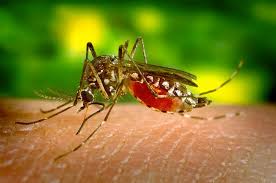Mosquito-borne Zika Virus in South Florida

The school year has started up yet again, bringing along with it awful farmer’s tans and a general sense of grumpiness throughout the student population. While students lost leisure time as the calendar hit August 15, the official Insect of Florida, the mosquito, has stayed as consistent as ever. They replace the red marks on our body from sunburns with red, itchy and irritating bumps. Unfortunately, the mosquito’s really annoying friend from the beginning of the summer has stayed with us, and has become clingier than ever anticipated.
In the good ol’ days (AKA, 2015), the mosquito and people in South Florida had an intimate relationship. The mosquitoes would bite us, we would get annoyed, and the cycle would repeat itself continuously. Unfortunately, humans are now third-wheeling this relationship, as mosquitoes have brought their best pal, the Zika virus, all the way from the forests of Uganda to us.
The Zika virus is feared mostly by pregnant women because if they were to be infected, their unborn child may contract microcephaly, a disease which deforms the baby’s head while still in the womb. For those who aren’t unborn children, microcephaly can cause short-term paralysis. Luckily, Zika isn’t a particularly deadly disease, only killing nine people worldwide thusfar.
Unfortunately, not being a pregnant woman doesn’t prevent one from acquiring this disease, nor facing its symptoms. For those who aren’t pregnant, one may face a high fever, skin rashes, pink eye, joint pain and frequent migraines. In a MedicalDaily article, Dr. Sanjay Gupta said that four out of five people infected with the virus do not show any symptoms and are likely to never realize that they even had the virus, and that the virus can stay in the person’s body for about a week.
When The Torch last wrote on the Zika virus, it was in South Florida but only through travel related cases. Now, mosquitoes are actively carrying the Zika virus and they are now 36 locally-transmitted cases in southern Florida. In Palm Beach County, there is only one locally-transmitted case, but 25 travel-transmitted cases. While Palm Beach County hasn’t been as hammered as places such as the Miami community of Wynwood and Miami Beach, the fact that a potentially lethal virus is abundant just an hour away from us may instill some panic, and hopefully awareness.
According to the Palm Beach Post, the Palm Beach County School District and other school districts in South Florida are ready to, “[take] its…precautions for mosquito prevention.” One precaution the Miami-Dade School District is taking is the possibility of changing the times of outdoor sporting events, including football games. Furthermore, it has been advised to limit standing water, as that is a primary location where mosquitoes breed.
Preventing the spread of Zika in your local area, whether that be at school, at home or anywhere else, can be as simple as applying bug spray and removing puddles of standing water.
The paranoia over the Zika virus will soon pass just as the paranoia passed over Ebola. As more research comes out on how to prevent and treat this disease, South Floridians will be more prepared in the face of this disease. There is no need to completely isolate yourself from the outside world because of this, but it is better to be aware and do as much as possible to limit the chance of transmission.









Makayla and Gillian • Jul 23, 2017 at 10:46 am
Do job bud we’re proud!